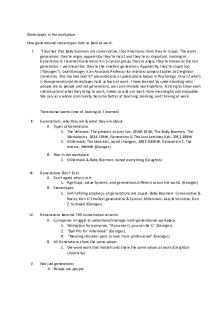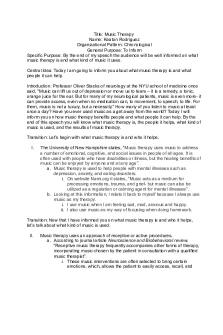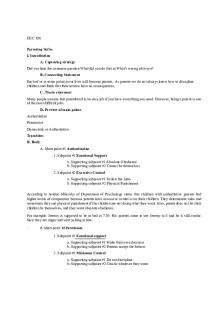Informative speech PDF

| Title | Informative speech |
|---|---|
| Course | Introduction to Speech Communication |
| Institution | Dallas College |
| Pages | 4 |
| File Size | 135.6 KB |
| File Type | |
| Total Downloads | 2 |
| Total Views | 139 |
Summary
informative speech outline format...
Description
Speech 1311
Informative Speech Topic: The reason why depression should be taken seriously Specific Purpose: To inform the audience on the dangers of depression; how it affects your physical and psychological wellbeing.
INTRODUCTION Feeling tired all the time? Losing interest in things you once loved before? easily agitated, unable focus at school or work? Well, I’m here to inform you that you are not alone. According to The National Alliance on mental health (NAMI), the nation’s largest mental health organization, more than 19 million adults across the united states, suffer from depression. Thesis: Today, I will be speaking to you about depression in the United States of America. I will talk about the background, the causes of this disease, the symptoms, long term effects and finally, the treatment and preventative measures to take. 1. WHAT IS DEPRESSION? A. Depression is defined by Encylopaedia Britannica, as a severe mood disorder, characterized by feelings of low self-worth and guilt with a decreased ability to enjoy life. Depression can range from mild to severe. Chronic depression is long lasting depression, often accompanied by anxiety and restlessness. It takes a significant toll on a person’s ability to enjoy things, their work and health and the way they interact with the people around them. B. According to www. www.nimh.nih.gov/., depression has been shown to have higher rates in women than men. Among the 19 million American adults affected, 8.7% are females and 5.3% are males. Depressive illness often interferes with normal functions of everyday life, as well as, causing physical pain for those who suffer from depression. Serious depression can destroy family’s lives as well as the person affected. A lot of people, who are depressed, do not seek help or treatment.
2. WHAT CAUSES DEPRESSION? There are a variety of causes depression. Below are causes, as listed on https://www.mentalhealth.gov/ i. It can be caused inherited through genetics. vii. Climate change ii. It can be caused by unfavorable life events.
Speech 1311 iii. Environmental factors, such as (life at home or moving to a new city). iv. Biochemical factors (such as neurotransmitters in the brain). v. Extreme constant stress (causes changes in the brain) vi. Childbirth (Postpartum depression) 3.
WHAT ARE THE SYMPTOMS? Depression is more than just the normal, temporary felling of sadness and
hopelessness. The feelings can last weeks, months or even years. They cause a collapse in your everyday life. According to https://www.nami.org, the symptoms of depression include: i. Not enjoying the daily activities in your life. ix. Suicidal thoughts ii. Problems concentrating. x. fatigue iii. Poor memory. xi. Slow thoughts or speech iv. Having trouble making decisions. v. Changes in eating habits. vi. Weight gain or weight loss. vii. Difficulty completing tasks viii. Changes in eating habits or appetite loss 4. LONG TERMS EFFECTS ON PHYSICAL AND PHYCHOLOGICAL WELL-BEING According to National Depression Screening Day, only 35.3% of those suffering from depression, request help from mental health professionals. If left untreated, depression can lead to several serious illnesses, heart disease, etc. It also impacts your everyday life can lead to suicide or even death. i. According to www.mhanational.org, depression causes the physical and chemical ii. changes in the brain. The affects the regular functioning of the brain. It causes a disrupt in neurotransmitters (nerve cells) that carry information. that controls our mood, appetite and motivation. iii. It affects how you think, feel and relate to others. iv. Causes rise in cortisol level. Cortisol is responsible for your fight/flight hormone “adrenaline”. This will leave you constantly anxious/ worried. v. Weakness the immune system, leaving your body susceptible to even basic illnesses, like the common cold. vi. Shortens life expectancy vii. Affects chromosomes (which makes DNA viii. Can cause hypertension, coronary heart disease, heart failure,
Speech 1311 blood clot, etc. ix. It can lead to Bipolar disorder, or other serious mental disorders. x. Can cause a decline in friendships and romantic relationships. Depressed people are often distant, or unable to form or maintain their relationships.
5. TREATMENT/PREVENTATIVE MEASURES A. Depression is usually treated with antidepressants, which according to
https://healthcare.utah.edu, has a 50-60 % success rate, psychotherapy, counseling, ECT (Electroconvulsive shock therapy) , which has a 70-90 % success rate. People with depression can be treated as outpatients or in some cases a person must be hospitalized. B. According to www.health.org.com, here are some ways to prevent you from becoming depressed. i. Try to be with other people. ii. Participate in activities that may make you feel better. iii. Mild exercise or yoga. iv. Going to a movie, a ballgame, or participating in religious, social, or other activities that may help. v. Most importantly let your family and friends help. 6. CONCLUSION Depression is a serious and life-threatening illness. It takes a toll on one’s quality of life, if left untreated. It is very important that you seek help immediately, if you are experiencing any of these symptoms. “Today, I have informed you about depression. I covered the definition, the causes of the disease, the symptoms, long term effects and finally, the treatment and prevention of depression.
Speech 1311
References
Ghiadoni, L., Donald, A. E., Cropley, M., Mullen, M. J., Oakley, G., Taylor, M., ... & Deanfield, J. E. (2000). Mental stress induces transient endothelial dysfunction in humans. Circulation, 102(20), 2473-2478. www.healthcare.utah.edu/healthfeed/postings/2017/02/ect.php www.health.org/depression https://www.mentalhealth.gov/what-to-look-for/mood-disorders/depression https://www.mhanational.org/national-depression
https://www.nami.org/Learn-More/Mental-Health-Conditions/Depression
https://www.nimh.nih.gov/health/statistics/major-depression.shtml The Editors of Encyclopaedia Britannica. “Depression.” Encyclopædia Britannica, Encyclopædia Britannica, Inc., 17 Nov. 2019, https://www.britannica.com/science/depressionpsychology....
Similar Free PDFs

Informative speech
- 4 Pages

Informative Speech
- 3 Pages

Informative speech
- 3 Pages

Informative Speech
- 3 Pages

Informative Speech
- 3 Pages

INFORMATIVE SPEECH
- 6 Pages

Informative Speech
- 3 Pages

Informative Speech
- 8 Pages

Informative Speech
- 5 Pages

Informative speech
- 4 Pages

Informative Speech
- 2 Pages

Informative Speech Outline
- 5 Pages

Informative Speech Rubric
- 3 Pages

Informative Speech Outline
- 5 Pages
Popular Institutions
- Tinajero National High School - Annex
- Politeknik Caltex Riau
- Yokohama City University
- SGT University
- University of Al-Qadisiyah
- Divine Word College of Vigan
- Techniek College Rotterdam
- Universidade de Santiago
- Universiti Teknologi MARA Cawangan Johor Kampus Pasir Gudang
- Poltekkes Kemenkes Yogyakarta
- Baguio City National High School
- Colegio san marcos
- preparatoria uno
- Centro de Bachillerato Tecnológico Industrial y de Servicios No. 107
- Dalian Maritime University
- Quang Trung Secondary School
- Colegio Tecnológico en Informática
- Corporación Regional de Educación Superior
- Grupo CEDVA
- Dar Al Uloom University
- Centro de Estudios Preuniversitarios de la Universidad Nacional de Ingeniería
- 上智大学
- Aakash International School, Nuna Majara
- San Felipe Neri Catholic School
- Kang Chiao International School - New Taipei City
- Misamis Occidental National High School
- Institución Educativa Escuela Normal Juan Ladrilleros
- Kolehiyo ng Pantukan
- Batanes State College
- Instituto Continental
- Sekolah Menengah Kejuruan Kesehatan Kaltara (Tarakan)
- Colegio de La Inmaculada Concepcion - Cebu

